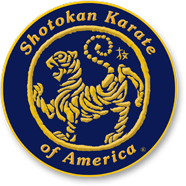About heat cramps, heat exhaustion and heat stroke.
The surest way to avoid heat-illness is to drink LOTS of water and be sure that you begin each karate practice very well hydrated.
Heat illness can become a very serious problem during special training when we are likely to feel exhausted and even though we are dehydrated after practice, we don’t feel very thirsty. But we must be sure to drink plenty of fluids between practices. Sports drinks are thought to be most effective because they contain both water and electrolytes.
During hot weather, especially with high relative humidity, and during any extended hard exercise without adequate hydration, the internal temperature of the body can rise and a number of heat-illness problems can result. If the body temperature increases above 104°F (40°C), permanent injury and even death can quickly occur.
Heat cramps are caused by a deficiency of water and sodium. They occur in worked muscles after exertion, often after profuse sweating and drinking water without adequate electrolyte replacement.
- Symptoms: pain and cramps in the muscles
- Treatment: Heat cramps are treated with rest and drinking water or electrolyte solution (such as Gatorade). Stretching or directing pressure on the muscles may decrease cramping.
- Heat cramps can usually be managed without trained medical assistance (as in most illnesses, elderly people may require more aggressive treatment and should be evaluated for all but the mildest cases of heat cramps).
Heat exhaustion is caused by excessive fluid loss in a hot environment. Sweating is present and the person’s temperature may be elevated, but not above 104°F (40°C).
- Symptoms: sweating; moist, pale, clammy skin; fatigue; headache; dizziness; shallow breaths; and a weak, rapid pulse. Victims of heat exhaustion are tired but not confused.
- Treatment: Heat exhaustion is treated with rest in a cool location, drinking water or electrolyte solution, elevating the feet 12 inches. IV fluids, if available. Untreated heat exhaustion may lead to heat stroke.
- Heat exhaustion can usually be managed without trained medical assistance (as in most illnesses, elderly people may require more aggressive treatment and should be evaluated for all but the mildest cases of heat cramps).
Heat stroke is the most severe form of heat-related illness. It occurs when the body’s heat-regulating mechanism fails. Temperature may be above 104°F (40°C) with warm dry skin. The very high body temperature damages tissues, including muscle and brain tissue. Heat stroke may lead to permanent disability and death.
- Symptoms: the skin is flushed, hot, and dry, and temperature may be very elevated. The victim may be confused, develop seizures, breathe shallowly, and have a weak, rapid pulse.
- Treatment: Heat stroke is treated with rapid cooling. Ice should be placed in the person’s armpits and in the groin. Keep the victim wet with a water spray, sponging, or wet towels, and blow air over the victim with a fan. Cool IV fluid should be infused, if available. Covering the person with ice or immersing in ice is not recommended.
- Seek medical treatment as soon as possible for heat stroke.
PREVENTION: The surest way to avoid heat-related illness is to drink LOTS of water and be sure that you begin each practice very well hydrated.
